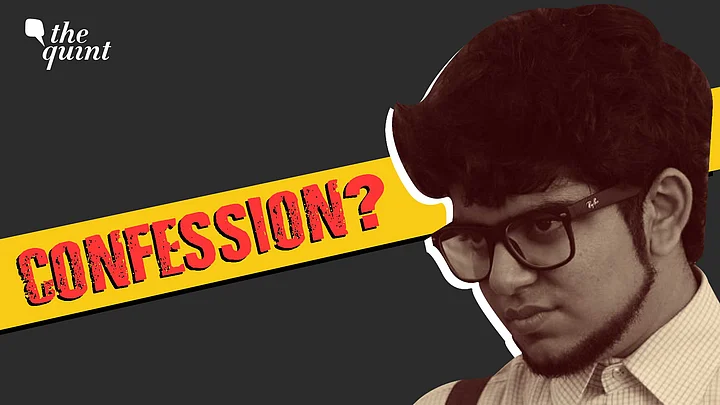Aaftab Poonawala, accused in the Shraddha Walkar murder case, was presented before Delhi's Saket court on Tuesday, 22 November. As the court extended his police custody for four more days, media reports suggest that Poonawala said that he hit her (Shraddha) in the “heat of the moment.”
However, after this so-called “confession” was made at the remand hearing, Poonawala’s lawyer Avinash Kumar clarified to the media that the accused did not admit to Walkar's murder.
Speaking to The Quint, Avinash Kumar said, "Media is running that he has confessed to the murder in court. But firstly, that is not admissible, neither is the confession that police say was given to them. He only said that he hit her (Shraddha) in the heat of the moment."
So, what do Aaftab's "confessions" imply legally? Are they admissible in court? Do they count as evidence? We explain.
Did Poonawala Really 'Confess' Before the Court?
Media reports have claimed that Poonawala confessed before the court, at his remand hearing, that he hit Walkar.
However, as pointed by Criminal Law Advocate Shrey Sharawat:
“Any statement not recorded before a magistrate under 164CrPc is not a confession. It is only a statement, and has no evidentiary value as it is hit by the bar of Section 24, 25 and 26 of the Indian Evidence Act."
But Sherawat adds that in some cases, such a statement, or a part of it, may become admissible. But we will get to the how, or when, of that in a bit.
For now, according to Section 164 of the Criminal Procedure Code (CrPc), a magistrate (and only a magistrate) may record any confession made before him. But the procedure under this section also says:
Before recording any such confession, the magistrate must explain to the person making it that he is not bound to make a confession and that, if he does so, it may be used as evidence against him
The magistrate must have reason to believe that the confession is being made voluntarily
The magistrate must make a signed memorandum at the foot of such record to the following effect:
"I have explained to (name) that he is not bound to make a confession and that, if he does so, any confession he may make may be used as evidence against him and I believe that this confession was voluntarily made. It was taken in my presence and hearing, and was read over to the person making it and admitted by him to be correct, and it contains a full and true account of the statement made by him.”
Further, the confession is to be recorded in the manner laid out in Section 281 CrPc. It shall also be signed by the person making the confession.
Nothing in existing media reports indicates that Aaftab Poonawala's alleged admission of hitting Walkar, was in compliance with the procedure under 164 CrPC. Was a memorandum recorded? Was the "confession" signed? Until these things are established firmly, one cannot say that he has made any confession in court.
What About 'Confession' Before the Police?
The same logic applies. Nothing will really count as a legally admissible confession unless it is made, in accordance with 164 CrPc, before a magistrate.
Further, as pointed out by the Supreme Court in State of UP vs Deoman Upadhyaya:
"Whether a person is in custody or outside, a confession made by him to a police officer...is not provable against him in any proceeding in which he is charged with the commission of an offence."
What this means is that a statement given to the police is inadmissible.
Why This Matters (Remember Rhea Chakraborty)?
This is a pertinent qualification as statements recorded by investigating authorities lack credibility.
In 2020, while sections of the media were jumping through hoops to paint actress Rhea Chakraborty guilty and many among the general public were breathlessly awaiting that same outcome without the slightest regard to the facts of the case, she had said that she was "coerced into making self-incriminatory confessions," while in NCB custody, by the officers who had interrogated her.
Several other, in other cases, have also, over the years said that they made statements under police pressure and have gone on to retract them. So it makes sense that statements or "confessions" made before interrogating authorities lack evidentiary value.
But Wait!
The apex court, in the Deoman Upadhyaya judgment, also notes:
As per Section 27 of the Indian Evidence Act, when any fact is said to have been "discovered” as consequence of information received from the accused while in police custody, “so much of such information...as relates distinctly to the fact thereby discovered, may be proved."
Advocate Sharawat further explains:
"If the statement so given (to the police) leads to the discovery of a fact, such part of that statement is admissible as evidence as per Section 27 of Indian Evidence Act."Criminal Law Advocate Shrey Sharawat
This essentially means that any information given by Poonawala to the police by will become admissible, if it leads to the discovery of any tangible piece of evidence
What Does this Mean?
As per the information available to us at the moment, nothing offered by Poonawala so far amounts to a confession of his guilt.
But some of the information claimed to have been received from him can become admissible in a court of law if his statement leads to the discovery of a fact.
So, when we watch TV tonight, and news-anchors yell at us about admissions and revelations and confessions, it might help for us to remember: just as all that glitters isn't gold, all that an accused says isn't a confession. A lot is still left for our investigating authorities to find out and find provable, admissible evidence for.
(At The Quint, we question everything. Play an active role in shaping our journalism by becoming a member today.)
